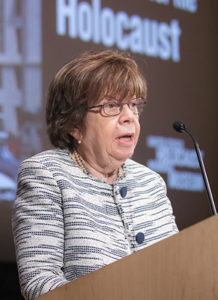WASHINGTON—The liberation of the Nazi death camps 75 years ago marked the end of the Holocaust but not the end of anti-Semitism, religious persecution or genocide, speakers emphasized at an event at the U.S. Holocaust Memorial Museum.
“We wish that we did not have to be gathered here today. But the reality is 75 years after the end of the Holocaust, communities continue to be at risk of genocide and related crimes against humanity, often targeted on the basis of their ethnic and religious identity,” said Naomi Kikoler, director of the museum’s Simon-Skjodt Center for the Prevention of Genocide.
Advocates for Chinese and Assyrian Christians and for Uyghur and Rohingya Muslims joined Holocaust survivor Dora Klayman and the co-chairs of the Senate Bipartisan Task Force for Combating Anti-Semitism at the Feb. 5 conference, held on the eve of the National Prayer Breakfast. The museum and 21Wilberforce, a Christian human rights organization committed to advancing freedom of religion, belief and conscience, sponsored the event.
“‘Never again’ means ‘never again’ for anyone”
Sen. James Lankford (R-Okla.) and Sen. Jacky Rosen (D-Nev.) emphasized the importance of speaking out for victims of persecution, calling out hatred and listening to the stories of survivors.
“We must be the ones to ensure that ‘never again’ means ‘never again’ for anyone,” Rosen said.

Klayman, who was born in 1938 in Zagreb, described how her parents were deported to Nazi concentration camps in 1941. Neither survived. Within a year, her grandparents also were deported and killed.
She and her brother were left in the care of her mother’s sister, Giza, and her Catholic husband, Ludva. In 1943, Giza was arrested and deported to Auschwitz, where she died of illness. On occasions, Klayman and her brother were sheltered in the homes of Catholic neighbors. After the liberation of the camps, Ludva legally adopted the two children who had been left in his care.
“The Ustaša (a fascist regime in Croatia that collaborated with the Nazis) killed hundreds of thousands of Serbs, Roma and Jews in the era of the Holocaust—people they identified as ‘the other’ or as political enemies—people they decided didn’t have the right to exist,” Kayman said.
“The history of the Holocaust—my history—highlights the precariousness of persecuted people and the power of individuals, even whole towns, to stand up and do what is right, even in extraordinary times.”
Sign up for our weekly edition and get all our headlines in your inbox on Thursdays
Heroic faith leaders too few in number
Unfortunately, too few Christians took a stand against the Holocaust and sheltered persecuted people, said Rebecca Carter-Chand, acting director of programs on ethics, religion and the Holocaust at the U.S. Holocaust Memorial Museum.
“We might expect that people of faith were helpers and rescuers, propelled by unwavering moral conviction to fight injustice and act with compassion. Unfortunately, the history is often far more complex. … All too many Christians welcomed the rise of Nazism, and all too few engaged in protest, rescue or resistance,” she said.
Outside of Germany, a disturbing number of European Christians were “perpetrators, bystanders or beneficiaries” of the Nazi regime and the Holocaust, she added.
“The widespread complicity and involvement of ordinary people in this genocide—and in other genocides up to the present day—challenge us to rethink our assumptions about human decency and morality,” she said.
“People who went out of their way to speak out against racial policies or provide shelter, assistance and community to those facing persecution and violence during the Holocaust were the exception, not the rule.”
Panel explored modern-day genocide

A panel discussion featured Yasmin Ullah, president of the Rohingya Human Rights Network; Nawaf Ashur from the University of Nebraska-Lincoln and board member of the Free Yezidi Foundation; Loay Mikhael, head of foreign relations with the Chaldean Syriac Assyrian Popular Council; Omer Kanat, executive director of the Uyghur Human Rights Project; and Bob Fu, founder and president of ChinaAid.
Kikolar, who moderated the panel discussion, noted “early warning signs” that preceded acts of genocide against some of the communities represented— restriction of human rights, discrimination, dehumanizing language, and violent acts.
“We know that often ethnic and religious minorities can serve almost as canaries in the coal mine in many situations, … (signaling the presence) of ominous things to come,” she said. “But we also know that when those warning signs are present, we can and should take action to try to address those risks and, ideally, help save lives.”
Panelists noted:
- After decades of persecution, violent acts by the military in Myanmar—also known as Burma—against the Rohingya led to the forced displacement of about 1 million people into neighboring Bangladesh. Survivors suffer from continuing trauma, living in unimaginably horrific conditions in refugee camps, Ullah noted. “It eats away at your psyche. It eats away at your hope of being able to live a better life,” she said.
- The Yezidi—or Yazidi—people were victims of genocide at the hands of ISIS in Iraq. Many of those who survived were displaced. “We have a whole generation of traumatized people,” Ashur said. Likewise, the Christian population of Iraq systematically has been reduced from about 1.5 million to about 250,000 or fewer, Mikhael reported.
- The Uyghurs have been persecuted for decades, but since 2017, the Chinese government began “carrying out a campaign to exterminate Uyghur identity,” Kanat said. “This repression now is being called by many experts an ethnic cleansing, crimes against humanity and the largest incarceration of an ethno-religious group since the end of the Second World War.”
- In the past two years, Chinese repression against all people of faith has intensified, Fu noted. Religious leaders of all faiths have been required to pledge loyalty to communist ideology or face imprisonment, he noted. Chinese children have been forced to sign a document renouncing the faith in which they were nurtured, and Buddhist monks have been compelled to sing communist anthems in their temples. “Clearly, the aim is to exterminate any independent faith,” Fu said.
Randel Everett, founding president of 21Wilberforce and former executive director of the Baptist General Convention of Texas, challenged participants in the event to speak out against persecution. He particularly invited participation in an advocacy campaign for the Uyghurs and to urge support for the Uyghur Human Rights Act of 2019, SB 178.
“We must confront oppression,” Everett said.
View a video of the “Religious Persecution 75 Years after the Holocaust” program here.














We seek to connect God’s story and God’s people around the world. To learn more about God’s story, click here.
Send comments and feedback to Eric Black, our editor. For comments to be published, please specify “letter to the editor.” Maximum length for publication is 300 words.